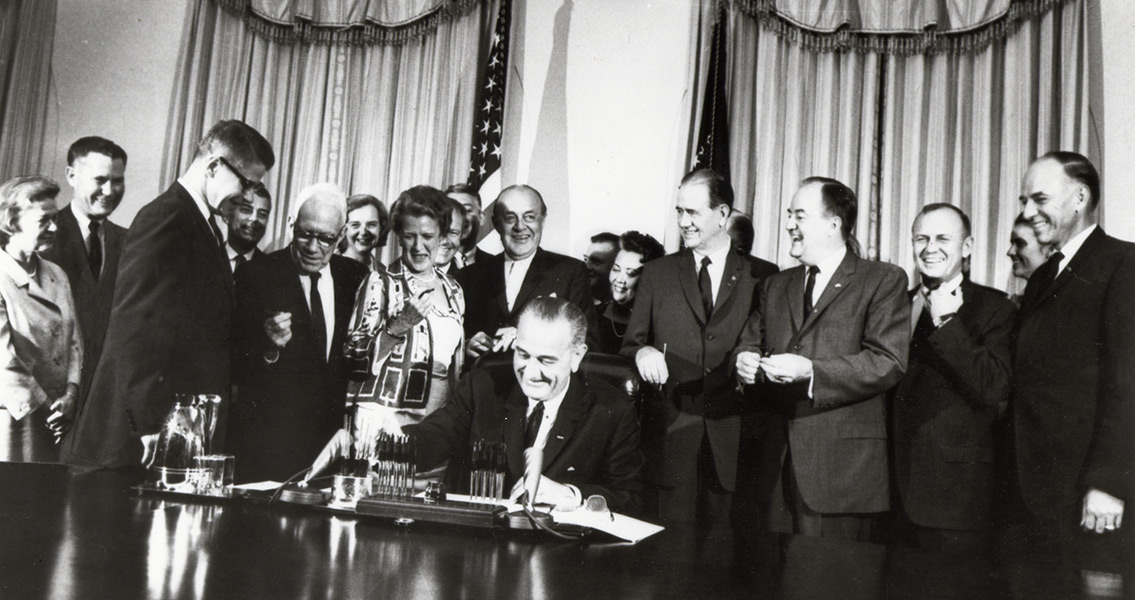<![CDATA[The War on Poverty is the unofficial name for a raft of measures introduced by former US President Lyndon B. Johnson. This legislation attempted to address high poverty rates in America in the mid-1960s; the national poverty rate in this period was around 19%. As a result of these measures, poverty rates in the US dropped to their lowest level since comprehensive records began, falling to 11.1% in 1973. To this day, many people still benefit from the federal programs Head Start, Volunteers in Service to America (VISTA), TRIO, and Job Corps first created during the War on Poverty. In the southern states, however, Johnson's policies encountered significant opposition. In part, this was due to the fact that impoverishment and race served to reinforce social and economic systems. Urban antipoverty initiatives effectively sought to transgress class and race boundaries, bringing empowerment to non-white groups. As a result, southern politicians and officials wanted to control the governing poverty program boards. The possibility of African Americans or Mexican Americans gaining political and economic power provoked a concerted backlash. New research has focused on the War on Poverty in Memphis, Tennessee. Gail Shmunk Murray, from Rhodes College, Memphis, has been examining poverty programs in the city, providing a fascinating case study with which to understand this period. The War on Poverty in Memphis encountered vehement opposition in its first five years. Local municipal officials viewed the federal program of poverty alleviation with contempt. After this initial period, however, measurable improvements were made to alleviate poverty. Successes went hand-in-hand with a marked shift away from federally-administered programs. The Nixon administration redirected the War on Poverty to federal-local shared governance. "The Republican “New Federalism” advocated using federal grants to augment state-funded antipoverty and other social programs rather than having a federal bureaucracy (OEO) directly funding local agencies," Murray wrote in his report, published in the forthcoming edition of the Journal of Urban History. This new, state-level style of organisation made considerable headway in combating poverty. Particularly successful initiatives worked outside the public view with criminals. VISTAs developed a prisoner-release mentoring scheme which attempted to aid recently-released prisoners in adjusting to normal life. Help was given with getting jobs and other parts of the prisoners' rehabilitation. "Thus, the Memphis antipoverty programs that lasted tended not to be identified with Washington and the federal War on Poverty but with structural changes linked to ongoing municipal operations like court procedures and community services," Murray wrote. "These Memphis programs may not have been the sort originally intended by Lyndon Johnson’s administration. But they worked." Interestingly, very few of those organising poverty-alleviation projects came from working class backgrounds. Murray notes that the vast majority, over 80%, of VISTAs were college-educated. It is clear, therefore, that antipoverty groups were not grass-root organisations which sought to deal with problems in their own locale. Murray believes these movements, however well-intentioned, were deeply paternalistic. Local antipoverty efforts concentrated in Memphis " did not seek the voices and ideas of those experiencing poverty," Murray wrote. Murray's paper highlights some intriguing aspects of the Johnson-instigated War on Poverty. Whilst the War on Poverty encountered significant opposition in the southern states, it appears that this was not necessarily an indication that poverty was not an issue in the South. Rather, it seems that southern officials did not appreciate top-down federal reform, preferring locally-organised initiatives instead. For more information: www.juh.sagepub.com Image courtesy of Wikimedia Commons user: Magnolia677]]>
New Perspectives on The War on Poverty
